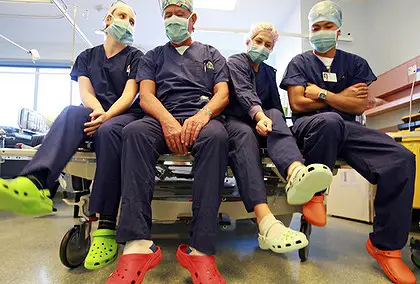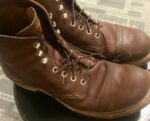As a doctor who frequently engages in hospital operations, it is recommended that you wear proper and supportive footwear. Standing for a lengthy amount of time might be harmful.
Your feet, legs, and back are the most vulnerable, especially if the shoe you’re wearing isn’t doing its job of supporting you.
Crocs are a type of footwear that was originally presented on the market in 2002. Toddlers and young adults wear them the most. The secret to Crocs’ enormous success is its unique features, such as how readily they clean and how light they feel after wearing them.
However, there is one group in particular that has reaped significant benefits from these clogs. We’re talking about the medical community. Crocs clogs are worn by millions of physicians and nurses worldwide.

Crocs, according to surgeons, are comfortable and simple to clean. As doctors, they are expected to handle a variety of biological fluids that might easily leak from containers and land on their feet and clothes, contaminating everything they come into contact with.
Also, they are ideal for surgeons because they provide adequate cushioning and comfort to the feet as they spend a significant amount of time standing or walking around.
10 Reasons Surgeons Wear Crocs at Work
1.) Supports the posture
Standing for 12 hours is a frequent problem for physicians and nurses, and it can cause leg pain. Furthermore, when you have been on your feet for the most of your shift, carrying large things and conducting rigorous operations, you might put strain on your legs.
There are several strategies to minimise uncomfortable symptoms in your back and feet, some of which include frequent exercise and stretching. A good night’s sleep can aid in the recovery of your body.
All of these methods are less successful than donning crocs. Crocs are shoes made for medical practitioners. The insoles are comfy, and the strong inside gives extra support and helps to keep your back from straining.
2.) They provide good traction on slippery floors
Slippery floors are one of the biggest hazards of working in a hospital. Cleaners clean the floors on a regular basis, but when you’re in a rush to meet patients, you can’t always see what’s on the floor in front of you.
During surgery, your focus is mostly on your patients, making it impossible to consider whether there is anything hazardous on the floor.
Slip-resistant crocs are the answer because they give more grip on slippery flooring, significantly lowering the danger of slips, trips, and falls.
3.) They’re easy to clean
Crocs are constructed of rubber and can be cleaned with a damp cloth. To clean the crocs, gently scrape the surface with a piece of wet towel.
You have now cleaned your crocs, which is why so many people enjoy wearing them. Furthermore, you do not need to perform it on a regular basis.
4.) They’re stain resistant
Surgeons are in constant contact with human blood, urine, and excrement. Linen shoes would be useless in such circumstances as fluids would collect between the fibres, attracting germs and emitting foul smells.
Crocs is entirely waterproof and bacterial resistant. As a result, there is no chance of stains or foul odors.
5.) They help improve productivity
Even your favourite shoes lack the supportive features you need while working in an environment that requires you to stand for a long time.
Crocs are made for comfort and may be worn during surgery and in the hospital, and they are ready for your professional demands.
6.) They provide adequate ventilation
Closed-toed shoes generate sweating, which promotes the growth of germs and fungi on the foot. Nurses who wear closed shoes are more likely to get fungal infections in their feet. In addition to having sweaty feet, doctors feel less productive when wearing closed shoes.
7.) They come without laces, therefore they’re easy to maintain
Another advantage is that it keeps someone from stumbling and injuring themselves when dealing with a patient. You don’t have to worry about whether it fits your leg because there are no laces. Doctors are unlikely to be trapped attempting to wear crocs after wearing them incorrectly.
8.) They’re extremely comfortable
Some procedures are more challenging than others and might take longer than planned. Surgeons must sometimes stand for more than 8 hours to complete an operation.
In that circumstance, a comfy shoe is required. You won’t have cramps, numbness, or discomfort in your feet, legs, or knees this way.
Crocs clogs are incredibly comfy and practical. They also provide ample space for your feet to roam in various directions. This reduces pressure points and improves blood circulation in the foot.
9.) They’re strong and durable
Crocs have a lengthy lifespan since they are constructed of rubber and take a long time to wear. Although the color may vary over time, this does not diminish the fact that they are durable. Because of their endurance, they are the most cost-effective options for everybody.
10.) They’re affordable
Surgeons’ shoes must be replaced in order to limit pathogen growth. Doctors at certain hospitals and clinics pay for their own outfits. So, in this career, pricey shoes are not an option.
A pair of Crocs for adults does not cost more than $100. In rare situations, they may be found for less than $30. This is a major relief for surgeons and nurses since it means they won’t have to spend as much money on shoe replacements.
See also: How to Shrink Crocs? (Fast and Simple Ways)
Should surgeons be wearing crocs for a long period of time?
According to research, doctors spend more money on Crocs than on canvas shoes or sneakers each year. This demonstrates not just their devotion to the brand, but also the value of this comfortable footwear in their employment.
Crocs, according to several podiatrists, are not suited for anyone’s feet. Crocs are not hazardous for your feet in general, but symptoms appear if you wear them for more than 10 hours every day.
The issue with Crocs is that they are unable to secure the heel while still providing adequate arch support. This leads the toes to grasp, resulting in a variety of issues such as deteriorated toe deformities, tendonitis, corns, nail issues, and calluses.
Crocs are also known to produce a whole slew of issues in the shank area of the foot. The shank region is a ligament that runs from the heel to the toe.
If you wear Crocs for more than 10 hours every day, the shank area becomes inflamed and might cause persistent pain. If you ignore your heel discomfort or ankle irritation, the pain will spread to your hip region and create back pain.
As a result, wearing Crocs for extended periods of time can hurt not just your feet and the areas around them, but also your entire body.
We have seen above how wearing crocs for long hours impacts a doctor’s health. Now let us see what are the disadvantages of wearing crocs?
1.) Not great for adverse weather.
The weather in the Midwest is notoriously fickle. One moment it’s 75 degrees and bright, the next it’s the severe cold. Crocs do not give the necessary protection from freezing cold as they will make your feet freeze.
2.) Sweat, stinky feet in humidity
Crocs’ rubbery inside generates awful foot perspiration, dooming Croc wearers to have foul smelling feet all day, especially if doctors are wearing it on a hot, humid day for long hours.
3.) They can cause blisters
It is impossible to go more than an hour in Crocs without the hard rubber sides creating terrible blisters on the sides and backs of the feet because of the friction.
FAQs-
1.) What is the importance of good footwear for doctors and surgeons?
Medicine may be a physically demanding profession. Both doctors and nurses are required to attend appointments, meetings, and operations, as well as travel throughout a hospital or clinic. Given such responsibilities, strong and comfortable footwear like crocs are a must.
Another reason why crocs are significant in medicine is to protect against environmental hazards. Footwear that is prone to breaking might injure not only the user, but also vulnerable patients who may be in the vicinity of a tripping doctor or nurse.
See also: Why Do Nurses and Doctors Wear Clogs?
2.) Can you wear socks with crocs?
The answer is yes. If it’s a cold day, to protect your feet from freezing cold, it is ideal for you to wear socks with your crocs to keep your feet warm and cozy.
Recommended crocs for surgeons and doctors
1.) Crocs Unisex Work Shoes
These crocs come with incredible arch support and are super comfortable.
Check them out here-
- THE PERFECT WORK CROCS: Do your shoes live up to your career specialty? The Specialist II Clogs are the Crocs work shoes men and women need because they are perfect for long days and nights
- EASY TO CLEAN: Crocs Specialist II clogs are easy to clean by just using soap and water and allowing for a quick dry
- WHAT SIZE SHOULD I BUY?: These Crocs for work offer a roomy fit and we recommend ordering a size down to the next largest whole size
- THICK CONSTRUCTION FOR TOE PROTECTION: The Crocs At Work collection was designed with nurses, chefs and handworkers in mind. The thicker toe and metatarsal regions protect feet from spills
Prices pulled from the Amazon Product Advertising API on:
Product prices and availability are accurate as of the date/time indicated and are subject to change. Any price and availability information displayed on [relevant Amazon Site(s), as applicable] at the time of purchase will apply to the purchase of this product.
2.) Stico Slip Resistant Chef Clogs
These crocs are lightweight as well as sturdy and come with good traction that provides safety in a wet, slippery hospital floor.
Check it out here-
- STICO SHOES RUN LARGE: For a snug and proper fit, please size down your STICO shoes as they run one size larger.
- SLIP RESISTANT TECHNOLOGY: Equipped with Nanotech Ceramic Anti-Slip technology, STICO outsoles are made from ceramic powder and rubber.
- ABRASION AND DURABILITY: Outsoles are made with Abrasion Resistant (NBS) Technology that equip STICO shoes with high resistance to oil, slip and have high durability or abrasion.
Prices pulled from the Amazon Product Advertising API on:
Product prices and availability are accurate as of the date/time indicated and are subject to change. Any price and availability information displayed on [relevant Amazon Site(s), as applicable] at the time of purchase will apply to the purchase of this product.
3.) YUNG Slip Resistant Clogs
Extremely adaptable, easy to clean, and simple to slip on and off, making it excellent for extended hours of labor. They are also engineered to reduce noise when walking which is an ideal feature in a hospital environment.
Check it out here-
- SLIP RESISTANT TECHNOLOGY
- DURABLE & SAFE
- PREMIUM EVA MATERIAL
- COMFORTABLE & SILENT
- FOR ALL OCCUPATIONS
Prices pulled from the Amazon Product Advertising API on:
Product prices and availability are accurate as of the date/time indicated and are subject to change. Any price and availability information displayed on [relevant Amazon Site(s), as applicable] at the time of purchase will apply to the purchase of this product.
Conclusion
Crocs are an excellent option of footwear for physicians because of its ergonomics, durability, and simplicity of cleaning.
Surgeons and doctors choose Crocs because of the cleaning capabilities and the comfy fit, which relieves their feet of the agony caused by standing all day.
However, there are some things to watch out for while wearing crocs, but those issues can be minimised with proper care and effort.










